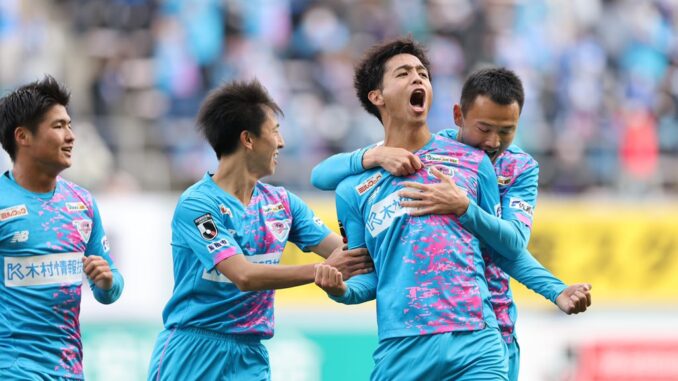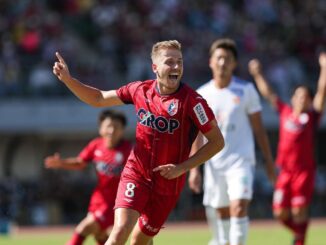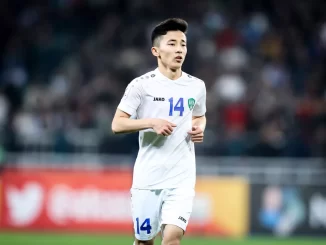
A couple of weeks into the start of the new J.League season it’s a familiar name at the top of the standings – defending champions Kawasaki have reeled off four wins from as many matches – but the team right behind them are winning admirers across Japan playing a brand of up-tempo football that has them defying pre-season predictions.
Not only were Sagan Tosu unfancied to be anywhere near the top of the table they were highly fancied by many to be major relegation contenders.
Yet after three straight wins, eight goals for and none conceded they’re nipping on the heels of the Kawasaki juggernaut and playing a brand of similarly entertaining, high octane, football.
To those outside of Japan the club is likely known as the obscure destination where Fernando Torres spent his final, waning, days as a footballer and in a not dissimilar manner to which the ex-Spain star has confounded expectations by morphing his lithe frame into that of a bodybuilder, so too have the unfancied Tosu completely revolutionised the way they play.
All against the backdrop of a desperate struggle just to survive.
Now in their tenth season in the top flight, Tosu have only recorded single digit finishes in three of those years and have for the bulk of that time been known as somewhat of a defensive-minded, reactive, team content to merely scrape through and survive year to year.
That’s also been the case off the pitch where financial troubles have tipped them to the brink of extinction on more than one occasion and the current year looms as a make-or-break one after the departure of their major financial benefactor late in 2018 has left them wading deep in red ink.
So perilous is the current situation that the team is wearing a huge strip across the back of their playing shirt that reads ‘pride of 17’ – that’s the name of a public fundraising campaign to try and ensure that the club can remain solvent.
The number 17 is one close to the club’s heart given its connection to the late Michitaka Sakata who was instrumental in the club’s founding but it’s a curious situation indeed to see a top-flight club in Asia’s leading domestic competition basically begging for community donations to keep it afloat on its matchday kit.
If that wasn’t odd enough, a close inspection of the club’s shorts for the current season will reveal the name of a popular anime series – Kingdom – after the series’ creator, Yasuhisa Hara, decided to personally sponsor the club that hails from the town of his birth.
The prefecture itself is a tiny one – 42nd of Japan’s 47 – and with barely 70,000 residents it’s easily, along with Kashima, one of the smallest regions to have ever hosted a top-flight football team in Japan.
With those issues around the club’s very survival bubbling away in the background they did little in the way of off-season recruitment, instead placing faith both in the youngest coach in the division – 39-year-old Kim Myung-hwi – as well as the youngest playing squad.
Three matches in and things are very much looking up.
A 1-0 win at Shonan on the opening day of the new season was followed by back-to-back home wins – 2-0 against Urawa and a 5-0 thrashing of Sendai – to see the club record three straight wins to start a new season for the first time in their J1 history.
More than just the results it’s the manner in which they’ve played that has been the most noteworthy element of the unexpected start.
There were hints of what the team would become from midway through last season when Kim slowly started to discard a band of ageing veterans and place his faith in a core group of youngsters, many of whom had come through the youth setup.
This year though, on early inspection, they’ve blossomed into a club full of non-stop movement on and off the ball and with a positivity to continually look to play forward.
They’re mobile and athletic, fast both in play speed and raw physical traits.
In the manner in which some owners take on certain characteristics of their pets, this team, oddly, tends to play in the same manner that their coach talks – full of short, sharp, bursts, that barely let the listener have a moment’s rest.
When possession is lost they immediately harass the opponent to try and win it back, then they’re a whir of passing when they get the ball back – almost always trying to push forward.
They play with a positivity, intensity and belief that was exemplified by pushing on in search of a fifth goal in the fourth minute of stoppage time in that most recent win over Sendai, at a moment where many other clubs would’ve simply wound the clock down.
They race to corners, look for quick restarts after fouls and appear to have settled nicely into a rejigged 3-1-4-2 formation that sees them comfortable in pushing deep into the opposition half.
What’s even more impressive is that the squad is, on paper, one of the more modest in the top flight yet one in which six different players have already found their way onto the scoresheet.
For context, only two other clubs have scored more than six goals in total thus far.
Journeymen central defenders Eduardo and Hwang Seok-ho are the only non-Japanese born members of the squad (they did sign two other foreigners but they’ve been unable to enter Japan due to COVID issues) and as such the core of the starting XI is local, young and in several cases homegrown.
Indeed four of the players that featured in that latest win are youth team products and there are a further five in the squad that also came through the ranks at a club that saw both their U15 and U18 teams win national titles last season.
That’s a frankly remarkable achievement for a region and club as small as Tosu and if the off-field issues can manage to abate then the signs are finally starting to look bright on the pitch and perhaps Sagan Tosu – and their awkwardly named (‘real estate agent in front of the station’) stadium could become the focus of greater attention as the new season continues to unfold in Japan.
Photo: J.League
Listen to Scott and Sean Carroll preview the J.League season in our TAG Extra special.




